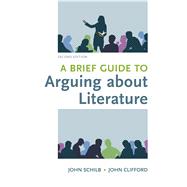
Note: Supplemental materials are not guaranteed with Rental or Used book purchases.
Purchase Benefits
Looking to rent a book? Rent A Brief Guide to Arguing about Literature [ISBN: 9781319035303] for the semester, quarter, and short term or search our site for other textbooks by Schilb, John; Clifford, John. Renting a textbook can save you up to 90% from the cost of buying.
8. Writing with Critical Approaches to Literature
Contemporary Schools of Criticism
New Criticism; Feminist Criticism; Psychoanalytic Criticism; Marxist Criticism; Deconstruction; Reader-Response Criticism; Postcolonial Criticism; New Historicism; Queer Theory
Working with the Critical Approaches
James Joyce, Counterparts (story)
Molly Fry, A Refugee at Home (student paper)
New James Joyce, Eveline
The New copy of this book will include any supplemental materials advertised. Please check the title of the book to determine if it should include any access cards, study guides, lab manuals, CDs, etc.
The Used, Rental and eBook copies of this book are not guaranteed to include any supplemental materials. Typically, only the book itself is included. This is true even if the title states it includes any access cards, study guides, lab manuals, CDs, etc.